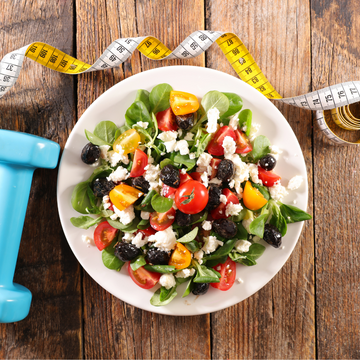How does food impact the Gut Brain Connection and our mood regulation?
The bidirectional relationship between the central nervous system and gut microbiota, known as the Gut-Brain Connection, has been of significant research interest in recent years (1). By the means of neural, endocrine and immune connections, links have been found between the emotional and cognitive centres of the brain and influences intestinal functioning (2). Gut dysbiosis and inflammation, the disruption of homeostatic composition and activity of gut bacteria (3), may be associated with disordered mood including anxiety and depressive behaviours (2). Specifically, Irritable Bowel Syndrome is a prime example of disruption between gastrointestinal function and central nervous system functioning (1), by which alterations in the composition of gut microflora due to consumption of triggering, high FODMAP foods, can exacerbate stress and anxiety symptoms often found in patients with IBS (5).
Among numerous factors including genetics, mode of birth delivery and health status, diet is considered an essential aspect impacting the human gut microbiota throughout one’s lifetime (4). Therefore, healthy food behaviors and dietary interventions may help regulate gut-brain connection to improve mood and mental health (4).
Increasing evidence has also associated higher levels of serotonin in the brain due to diet factors and physical activity, with lower levels of mood hostility and depression (5). Tryptophan, an amino acid found in animal protein, can cross the blood brain barrier to increase serotonin in the brain and recently has been investigated in its role in improving mood (6). Increasing tryptophan content of the diet, such as in milk and chickpeas, in accordance with that of other amino acids in protein-rich foods, has be speculated to improve mental health (6). Several lines of research also suggest exercise increases serotonin in the brain, producing anti-depressant effects (6). Particularly, fatigue during exercise can increase tryptophan availability in the brain and therefore, serotonin synthesis and possibly improvements mood (7).
How can we improve our Gut Microbiome and support immunity through good nutrition?
Research studies have confirmed that adherence to a ‘healthful’ diet, including increased intake of fruit, vegetables, whole grains and fish, is linked to reduced symptoms of depression (8). In particular, the Mediterranean Diet, which underlies the principles of the Be Fit Food meal plans and recipes, has been found to reduce disease risk, and depression at all ages by 30% (9). Adherence to a healthful diet, including that of the Mediterranean diet, is associated with positive microbiome alterations (10). Modulation of the gut microbiota through improvements in diet can potentially promote healthier ageing, immune function and mood improvements (10). The Supporting the Modification of Lifestyles in Lowered Emotional States (SMILES) study, concluded that improving dietary quality using features of the Mediterranean Diet, have a therapeutic benefit on depressive symptoms and mood regulation (11). Particularly, improved consumption of whole grain cereals, fruit, low-fat dairy, olive oil and fish, decreased processed meats, fried foods, sweets and sugary-sweetened beverages, combined with personal cooking and food shopping, is linked to improved mood regulation and prevention of depression (11).
Additionally, higher protein and lower carbohydrate diets, another underlying dietary principle at Be Fit Food, has been found to increase abundance of certain bacterium and micro-organisms in humans (4,12). This attenuation of gut dysbiosis is important in immunity as well as mood improvements and stress reduction through the Gut-Brain connection (4, 12). Another study found that reduction in total carbohydrate intake may reduce fermentation of certain gut bacteria resulting in a decrease anxiety like behaviours (13).
Understanding these influences of food intake on gut microbiota is important in the provision of informed dietary advice to improve long term physical and mental health status (14).
Practical tips for including foods for both a physical and mental wellbeing
- Adopt a more Mediterranean style diet (15)
This form of diet has been associated with improved mental well-being. Aim for an increase in consumption of fruit, vegetables, nuts and legumes, moderate consumption of poultry, eggs and dairy, and limited red meat and sugary food.
- Reduce intake of highly refined carbohydrates (15)
Diets high in these foods have been shown to have a detrimental effect on psychological and physical health and wellbeing. These mood irregularities are often due to rapid and repeated fluctuation in blood glucose levels due to high glycaemic load in these foods. Instead, opt for slower digesting carbohydrates like oats, wholegrain bread and basmati rice, and other low-carbohydrate foods like green vegetables and low-fat yogurt.
- Limit fast food intake (16)
High consumption of fast foods, high in saturated fat, sugar and salt, have been linked to depressive symptoms. These foods may induce inflammation, nutritional inadequacies disturbance of gut microbiome and therefore the interactions between the central nervous system and intestinal function, ultimately increasing risk of depression and diet related disease. Limiting intake of these foods and instead choosing to consume homemade meals made with wholefoods and fresh ingredients, more often, may improve mental and physical wellbeing.
The bottom line… there is growing evidence that a healthful diet inclusive of fruit, vegetables, olive oil, nuts, fish and whole grain, with reduced consumption of red meats, trans fats, sugary baked goods and fast foods, may improve mood regulation and prevent depressive and stress symptoms.
References
- Carabotti M, Scirocco A, Maselli MA, Severi C. The Gut-Brain Axis: Interactions between enteric microbiota, central and enteric nervous systems. Ann Gastroenterol. 2015 Apri; 28(2): 203-209. PMID: PMC4367209
- Bokor, S., et al., Single nucleotide polymorphisms in the FADS gene cluster are associated with delta-5 and delta-6 desaturase activities estimated by serum fatty acid ratios. J Lipid Res, 2010. 51(8): p. 2325-33. 1. Clapp M, Aurora N, Herrera L, Bhatia M, Wilen E, Wakefield S. Gut Microbiota’s effect on mental health: The gut-brain axis. Clin Pract. 2017 Sep 15; 7(4): 987. doi: 10.4081/cp.2017.987
- Carding S, Verbeke K, Vipond DT, Corfe BM, Owen LJ. Dysbiosis of the gut microbiota in disease. Microb Ecol Health Dis. 2015; 26. doi: 10.3402/mehd.v26.26191
- Oriach CS, Robertson RC, Stanton C, Cryan JF, Dinan TG. Food for thought: The role of nutrition in the microbiota-gut-brain axis. Clin Nutr Exper. 2016 April; 6: 25-38. doi: https://doi.org/10.1016/j.yclnex.2016.01.003
- Kennedy PJ. Cryan JF. Dinan TG, Clarke G. Irritable bowel syndrome: A microbiome-gut-brain axis disorder? World J Gastroenterol. 2014 Oct 21; 20(39)”: 12105-14125. doi: 10.3748/wjg.v20.i39.14105
- Young SN. How to increase serotonin in the human brain without drugs. J Psychiatry Neurosci. 2007 Nov; 32(6): 394-399.
- Young SN. The clinical psychopharmacology of tryptophan. Food Constituents Affecting Normal and Abnormal Behaviours. New York: Raven Press; 1986: 49-88.
- Lai JS, Hiles S, Bisquera A, Hure Aj, McEvoy M, Attia J. A systematic review and meta-analysis of dietary patterns and depression in community-dwelling adults. Am J Clin Nutr. 2013; 99(1): 181-197. doi: 10.3945/ajcn.113.069880
- Psaltopoulou T, Sergentanis TN, Panagiotakos DB, Sergentanis IN, Kosti R, Scarmeas N. Mediterranean diet, stroke, cognitive impairment and depression: a meta-analysis. Ann Neurol. 2013: 74(4): 580-591. doi: https://doi.org/10.1002/ana.23944
- Ghosh TS et al. Mediterranean diet intervention alters the gut microbiome in older people reducing frailty and improving health status: the NU-AGE 1-year dietary intervention across five European countries. Gut. 2020; 69: 1218-1228.
- Jacka FN et al. A randomised controlled trial of dietary improvement for adults with major depression (the SMILES trial). BMC Med. 2017 Jan 30; 15(23). doi: https://doi.org/10.1186/s12916-017-0791-y
- David LA et al. Diet rapidly and reproducibly alters the human gut microbiome. Nature. 2013 Dec 11. 505: 559-563.
- Scott KP, Gratz SW, Sheridan PO, Flint HJ, Duncan SH. The influence of diet on the gut microbiota. Pharmacolog Res. 2013 March; 69(1): 52-60. doi: https://doi.org/10.1016/j.phrs.2012.10.020
- Prasad A, Prasad C. Short-term consumption of a diet rich in fat decreases anxiety response in adult male rats. Physiol Behav. 1996; 60(3): 1039-42.
- Firth J, Gangswich JE, Borsini A, Wootton RE, Mayer EA. Food and mood: how do diet and nutrition affect mental wellbeing? BMJ 2020 June 29; 369: m2382. doi: https://doi.org/10.1136/bmj.m2382
- Huang Q, Liu H, Suzuki K, Ma S, Liu C. Linking what we eat to our mood: A review of diet, dietary antioxidants and depression. Antioxidants (Basel). 2019 Sep; 8(9): 376.







